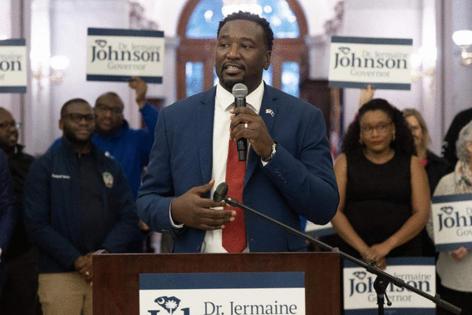Jermaine Johnson enters South Carolina governor's race. 4 things to know about the Democrat
Published in News & Features
COLUMBIA, S.C. — State Rep. Jermaine Johnson, a Richland Democrat, known for his charisma on the House floor, is making a bid for the governor’s office.
If Johnson wins the Democratic nomination, winning the statewide election in a reliably red state will be a long shot.
“This state has never seen a candidate like myself run for statewide office, in terms of for the governor position. And I’m something different. I’m somebody who’s just unapologetic about leading. I’m unapologetic about speaking out,” Johnson said in an interview ahead of Tuesday’s campaign launch.
After launching an exploratory committee in May, Johnson is the second Democrat to enter the governor’s race. Charleston attorney Mullins McLeod entered in August. Five Republicans are running as well: Lt. Gov. Pamela Evette, state Sen. Josh Kimbrell, U.S. Rep. Nancy Mace, U.S. Rep. Ralph Norman and Attorney General Alan Wilson.
Who is Jermaine Johnson?
Johnson is a state representative from Richland County who ousted longtime state Rep. Jimmy Bales in the 2020 Democratic primary. After redistricting he defeated former state Rep. Wendy Brawley, D-Richland, in the 2022 primary. In the general elections in both of those years, he defeated Republican Vincent Wilson. He was unopposed in the 2024 election.
Johnson also sells property and casualty insurance for Goosehead Insurance and works at Midlands Technical College as an adjunct professor.
He is a graduate of the College of Charleston where he played on the basketball team. He averaged 10.1 points, 7.4 rebounds and 0.9 assists, according to ESPN.
The Los Angeles native whose family experienced homelessness while he was growing up recently was the subject of documentary“I Got Myself a Yard” where he describes experiences growing up including having officers pull up and draw guns on him when he was a child because he was holding a toy gun.
Johnson has gained attention from outside the state for his floor comments during the debate over an anti-diversity, equity and inclusion bill as well as for comments over a proposed budget provision to make sure the state doesn’t send money to white supremacists organizations.
Why it makes sense for Johnson to run?
Johnson is a charismatic speaker with an ability to fire up a crowd. His remarks on the House floor have at times received a lot of attention online from outside of South Carolina. The charisma can help more than just him. If Johnson can turn out-of-state excitement into a reliable source of financial support, he can help down ballot races where Democrats hope to flip some State House seats.
“There’s some who view South Carolina as a crisis, but in the eyes of others there’s an incredible opportunity to not only rebuild our party, but restructure the direction we’re traveling and the road we’re traveling on, and the people who are actually putting the destination in the GPS,” South Carolina Democratic strategist Antjuan Seawright said. “And the destination has to get off of the exit ramp called winning.”
What advantages does he have?
Johnson will be seen as a likeable candidate.
“He’s someone who may take non-voters and convert them into voters. Obviously we can’t keep writing the same formula in South Carolina. We’ve lost a lot,” said Sam Skardon, a former chairman of the Charleston County Democratic Party. “Jermaine can convince enough moderates he is a reasonable rational guy.”
Johnson is in his third term as a House member.
“In the primary he doesn’t have an intense record to scrutinize,” Seawright said. “He got to the state House by taking on an experienced or seasoned veteran in the late Jimmy Bales, and he was able to galvanize and energize a community that somewhat viewed as voting in a traditional sense. He knows how to break traditional strong holds. I think with his background and experience, I think he has an opportunity to unite a different type of Democratic coalition both in the primary and general election.”
What challenges does Johnson face?
Johnson also has only been elected to a state House seat, each of which represent about 41,000 people.
He’ll now have to bring his message across the state both in the primary and if he goes on to win the nomination. If he’s the nominee, he will have to convince Republicans in South Carolina to crossover and vote for him in a state where the straight-party ticket voting is dominated by the GOP.
“Legislators are known well in their district but getting known around the state is something that takes a lot of time and money, and he’s going to have to raise the money,” Skardon said. “He’s got a young family. He’s going to have to spend a lot of time away from them in every corner of the state getting known. That’s hard to do.”
“Of course it’s going to be a challenge. He’s going to have to work hard to do it. I think it’s doable. I think the donor appetite is there for someone who can make a case, ‘I do have a path to victory. It’s new and different than what hasn’t worked before,’” Skardon added.
In 2022 when he ran against former state Rep. Wendy Brawley in the primary, Johnson raised $32,000 ahead of the Democratic contest. He raised $20,000 for the 2022 general election cycle. In 2020, in his primary race against former state Rep. Jimmy Bales, Johnson raised nearly $41,000. In the general election, he raised $7,900.
Johnson’s only opponent in the primary, McLeod, has deep pockets. McLeod put in more than $1.3 million of his own money into his campaign.
“I think money is always going to be a challenge for a Democrat, particularly on the other side of the primary running against Mullins McLeod who is a self-financier,” Seawright said.
_____
©2025 The State. Visit at thestate.com. Distributed by Tribune Content Agency, LLC.







Comments